IJCRR - 13(10), May, 2021
Pages: 133-136
Date of Publication: 19-May-2021
Print Article
Download XML Download PDF
A Cross-Sectional Evaluation Linked to Ear-Related Ailments Throughout Pregnancy
Author: Nayak MS, Satpathy S, Kala D, Sahoo G, Kar D, Bhuyan R
Category: Healthcare
Abstract:Background: Many changes occur in a woman's physiology during pregnancy. These include all the major organ systems- cardiovascular, hematologic, respiratory, etc. Objective: We aim to study the effects of pregnancy on symptoms related to the Ear. Methods: 40 pregnant patients attending the Obstetric outpatient department (OPD) were selected and given a questionnaire listing various ear-related symptoms in pregnancy. Based on the response to the questionnaire, data were tabulated and evaluated. Results: Imbalance in gait was found to be the commonest symptom followed by dizziness. Altered smell perception and increased ear secretion were the next common symptoms. Conclusion: Based on our study, we conclude that feeling of loss of balance and dizziness is the most common ear-related symptoms in pregnancy
Keywords: Pregnancy, Trimester, Sensori-Neural Hearing Loss (SNHL)
Full Text:
INTRODUCTION
The body of a female undergoes numerous changes during the menstrual cycle, at pregnancy and menopause. In pregnancy, there is increased demand for the rapidly growing fetus and placenta. To meet these demands the female physiology undergoes numerous alterations encompassing almost all major organ systems. These changes allow the growth of the baby and also protect both mother and fetus from certain risks associated with pregnancy and delivery. Weight gain is a highly noticeable change that occurs throughout pregnancy. Plasma volume expansion and hemodilution occurs in pregnancy with a fall of plasma osmolality and increased fluid in intercellular space.1 All this fluid retention that occurs can interfere with the sensorineural hearing system and changes in hearing may occur.2 The changed composition of the inner ear labyrinthine fluid may interfere with the sensitivity of the receptors in the inner ear and hence cause hearing-related symptoms in women- fullness in the ears, ringing in the ears, dizziness, hyperacusis or algiacusia.3 Symptoms like vertigo, tinnitus and sudden hearing loss are often associated with the action of estrogen and progesterone on the cochlea and semi-circular canals.4-6 We aim to study the occurrence of various auditory and vestibular complaints in pregnant women.
MATERIALS AND METHODS
The prospective cross-sectional non-randomised study was conducted on the patients attending Out Patient Department of Obstetrics and Gynecology (OPD O&G), and Ear Nose Throat (ENT) departments of Terna Medical College & Hospital. Forty (40) pregnant patients were included and given a questionnaire listing ENT symptoms after duly obtaining informed written consent. Patients had to fill up answers like ‘Yes’ or ‘No’. All participants were literate in English though Hindi and Marathi translations of the questionnaire were available. Institutional ethics committee approval was obtained before starting the study. Based upon the answers to the questionnaire, results were calculated after grouping women according to the three (3) trimesters of pregnancy:
-
GROUP 1(GTR1): 1st trimester: from confirmation of pregnancy till completion of 12 weeks.
-
GROUP 2(GTR2): 2nd trimester: from 13 weeks till completion of 28 weeks.
-
GROUP 3(GTR3): 3rd trimester: from 28 weeks till term.
Inclusion Criteria
All healthy pregnant females in the age group 20-35 years attending OPD. Patients in all three trimesters of pregnancy were enrolled after counselling.
Exclusion Criteria:
-
Patients having any ENT complaints before pregnancy.
-
Patients with hypertension, diabetes mellitus, any other chronic medical disorder like heart disease, renal disorder, epilepsy, etc.
-
Patients with alcoholism.
-
Any high-risk pregnancy
Results were analyzed using descriptive statistics.
RESULTS
In the current study, forty numbers of patients were enrolled and after meeting requisite inclusion and exclusion criteria they were asked to fill up a pre-prepared questionnaire. The questionnaire was based on eleven numbers symptoms that were studied during three trimesters of pregnancy [Table 1 and 2]. The symptoms that are observed during the studies are Imbalance in walking, Dizziness, Change in smell, Increased ear secretion, Increased nasal blocks, Headache, Earache, Tinnitus, Change in voice, Blackouts, Difficulty in hearing. The highest number of symptomatic patients were found at early pregnancy (GTR1) whereas fewer or rare symptoms were observed in second trimesters (GTR2) but maximum numbers of symptoms were studied at the late phase of pregnancy (GTR3).
Seven types of symptoms (Imbalance in walking, Dizziness, Change in smell, Increased ear secretion, Increased nasal blocks, Tinnitus, Difficulty in hearing) were common in all the phases of trimesters. Dizziness is regarded as the most common symptom with highest number of pregnant ladies (GTR1 = 23; GTR2 = 5; GTR 3 = 2). The lowest number of pregnant ladies were found with the symptom of low hearing (GTR 1 = 1; GTR 2 = 1; GTR 3 = 3), whereas the change in voice is the only symptom found in one pregnant lady of GT3 category [Table 2 and Figure 1].
DISCUSSION
The commonest symptom in our patients was a feeling of imbalance while walking (seen in 35 patients). This was seen maximum in the 3rd trimester (18 cases) followed by 15 cases in the 1st trimester. Instability in pregnancy could be due to weight gain and postural changes occurring as the pregnancy advances. Pregnancy is characterized by many changes–involving endocrine, cardiac, vascular and other systems along with oedema and weight gain which can affect the musculoskeletal system and posture.7 This reduction in postural stability is associated with the risk for falling, so much so that in pregnancy the risk of fall is comparable to that for elderly individuals.8
Dizziness and reeling of the head was the next most common complaint (seen in 30 patients), most of whom were in 1st trimester (23 cases). Similar findings are mentioned by Black FO.9 Attacks of vertigo can increase due to decreased serum osmolality seen in pregnancy and may be influence by the hormonal and fluid-volume changes in the vestibular system.9,10 Also, dizziness is more common in the 1st and 2nd trimester, which is in agreement with authors who reported that vestibular disorders normalize throughout the pregnancy duration, probably due to labyrinthine habituation.11
A change in the sense of smell was reported by 25 patients, and maximum cases were seen in 1st trimester (15). Patients frequently complained of increased sensitivity to oil, ghee and spices. Studies suggest that an increase in smell sensitivity is due to high levels of estriol and swelling of the olfactory membrane (12). According to National Geographic, Smell Survey conducted in the US including 13,610 pregnant and 277,228 non-pregnant women between 20-40 years of age, in comparison to non-pregnant women, pregnant women rated their sense of smell lower, rated the test odourless pleasant, more often classified the odours as inedible, were less likely to report odour evoked memories and used perfumeless.12
Increased secretions from the Ears were seen in 20 patients. A similar number of patients also complained of Nasal blocks. This is a very important thing to be kept in mind because many of the drugs used for these symptoms are available over the counter and carry a warning that these should not be used in pregnancy. Difficulty in hearing was described by 5 patients, three (3) of whom were in the 3rd trimester. Low-frequency sensorineural hearing loss (SNHL) in pregnancy has been described in the literature.13 This reduced hearing is again due to changes in estrogen and progesterone which cause alterations in the sensory nervous system and hearing mechanism.14
CONCLUSION
Based on our study, we conclude that feeling of loss of balance and dizziness are the most common ear-related symptoms in pregnancy. From a review of current literature, it can be safely concluded that pregnancy per-se, with its hormonal changes and resultant plasma volume alterations, affects the mechanism of the inner ear, but further research can be done in this field for a better understanding.
Conflict of interest: The authors declare there is no conflict of interest among them.
Funding: No funding or grant was availed by the authors during the study.
Author Contribution
Gangadhar Sahoo and Ruchi Bhuyan conceived, planned, designed and guided the study. Madhusmita Smrutibala Nayak, Deepa Kala and Shanta Satpathy, wrote the manuscript, screened the patient, and collected the data, performed the data to analysis statically. Final Modification editing and revising of the manuscript was carried out by Dattatreya Kar.



References:
-
Heenan AP, Wolfe LA, Davies GAL, et al. Effects of human pregnancy on fluid regulation responses to short term exercise. J Appl Physiol 2003;95:2321-2327.
-
Cunningham FG, MacDonald PC, Gant NF, Leveno KJ, Gilstrap LC, Hankins GD. Cesarean delivery and cesarean hysterectomy. Williams Obstetrics: Connecticut: Appleton Lange. 1997: 509-533.
-
Bittar RSM. As síndromes de equilíbrio na mulher. In: Formigoni LG, Gobbi AF. (coord.). Otoneurologia: fatos e experiências práticas. São Paulo: Editora Sarvier; 1999: 01-07.
-
Dengerink JE, Dengerink HA, Swanson S, Thompson P, Chermak GD. Gender and oral contraceptive effects on temporary auditory effects of noise. Audiology 1984;23:411-425.
-
Laws DW, Moon CE. Effects of the menstrual cycle on the human acoustic reflex threshold. J Audiol Res 1986;26:196-206.
-
Bittar RSM, Bottino MA, Bittar RE, Formigoni LG, Miniti A, Zugaib M. Estudo da função do ouvido interno na gestação normal. J Bras Ginecol 1991;101(9):381-383.
-
Ireland ML, Ott SM. The effects of pregnancy on the musculoskeletal system. Clin Orthop Relat Res 2000;372:169-179.
-
Dunning K, Lemarsters G, Bhattacharya A, Levin L, Alterman T, Lordo L. Falls in workers during pregnancy: risk factors, job hazards, and high risk occupations. Am J Ind Med 2003;44(6):664-672.
-
Black FO. Maternal susceptibility to nausea and vomiting of pregnancy: is the vestibular system involved? Am J Obstet Gynecol 2002;186(2):204-209.
-
Goodwin TM. Nausea and vomiting of pregnancy: an obstetric syndrome. Am J Obstet Gynecol 2002;186(5):S184-189.
-
Bittar RSM, Bottino MA, Bittar RE, Formigoni LG, Miniti A, Zugaib M. Estudo da função do ouvido interno na gestação normal. J Bras Ginecol 1991;101(9): 381-383.
-
Gilbert AN, Wysocki CJ. Quantitative assessment of olfactory experience during pregnancy. Psychosom Med 1991;53:693-700.
-
Bhagat DR, Chowdhary A, Verma S, Jyotsana. Physiological changes in ENT during pregnancy. Indian J Otolaryngol Head Neck Surg 2006;58: 269-270.
-
Baker MA, Weiler EM. Sex of listener and hormonal correlates of auditory thresholds. Br J Audiol 1977;11(3):65-68.
|






 This work is licensed under a Creative Commons Attribution-NonCommercial 4.0 International License
This work is licensed under a Creative Commons Attribution-NonCommercial 4.0 International License